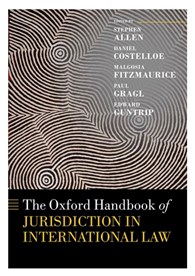Stéphane BEAULAC, « The Lotus Case in Context: Sovereignty, Westphalia, Vattel, and Positivism », dans Stephen Allen et al. (dir.), The Oxford Handbook of Jurisdiction in International Law (Oxford: Oxford University Press, 2019), 40-58
Résumé du livre :
Jurisdiction in international law limits the exercise of legal authority over international legal subjects. Yet, despite the fundamental role that jurisdiction plays in international law, the concept remains underdeveloped. Discussions of jurisdiction in international law regularly refer to classic heads of jurisdiction based on territoriality or nationality or use the SS Lotus decision of the Permanent Court of International Justice (PCIJ) as a starting point. However, traditional understandings of jurisdiction are facing new challenges. Globalization has increased the need for jurisdiction to be applied extraterritorially, non-state forms of law provide new theoretical challenges and intersections between different forms of jurisdiction have become more intricate. Consequently, it is necessary to re-examine the concept of jurisdiction in international law with reference to its history, its contemporary application and how it needs to adapt to encompass future developments in international law. This book provides an authoritative and comprehensive analysis of the concept of jurisdiction in international law. It provides fresh insights into the practical and theoretical function and content of the doctrine of jurisdiction in contemporary international law. By examining the concept of jurisdiction in international law thematically, the book considers jurisdiction from historical, theoretical and practical perspectives. It examines some of the most contentious elements of jurisdiction by considering how the concept is being applied in specific substantive and institutional settings. The book is an invaluable resource for academics, students and practitioners with an interest in the role of jurisdiction in international law.
Lien pour le livre :
Résumé du texte :
This chapter addresses the significance of the 1927 case of SS Lotus to assess jurisdiction in international law from a historical perspective. It situates the Lotus case in its historical context by considering the influence of the Westphalian legal order and Emer de Vattel’s understanding of state sovereignty on the Court’s judgment. The influence of both of these frameworks supports the positivistic stance taken by the Permanent Court of International Justice (PCIJ) in this decision, which remains present in the more recent jurisprudence of the International Court of Justice (ICJ). By examining the Lotus case, the chapter then looks at the theoretical assumptions that underpin state sovereignty and jurisdiction in international law.
Lien pour le texte :
https://papers.ssrn.com/sol3/papers.cfm?abstract_id=3380608












